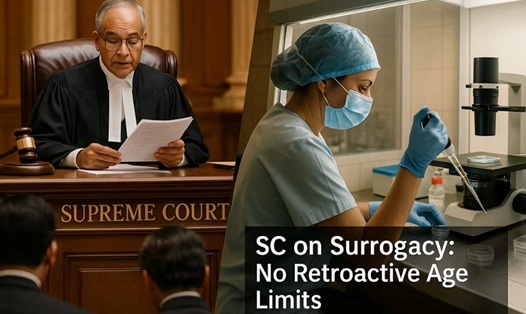(Preliminary Examination: Current Events of National Importance)
(Mains Examination, General Studies Papers 1 & 2: Population and Related Issues, Topics Related to Development and Management of Social Sectors/Services Related to Health, Education, Human Resources) |
Context
According to a significant Supreme Court ruling, the age limit under the Surrogacy (Regulation) Act, 2021, will not apply to couples who began their fertility process before the law came into force. This ruling is particularly significant for couples who froze their embryos and initiated surrogacy before 2022.

Background of the Ruling
- A Supreme Court bench delivered this ruling while hearing petitions filed by three couples. The couples argued that since they began surrogacy before the new law came into effect in 2021, they could not be disqualified due to the later age limit.
- Under Section 4(iii)(c)(I) of the Surrogacy Act, the woman must be between 23 and 50 years of age and the man between 26 and 55 years of age to be eligible for surrogacy. The couples argued that they had already frozen their embryos, and that disqualifying them based on this age limit was unfair.
Justice Nagarathna's Observations
- The Court opined in its judgment that it was unfair to apply the law retroactively against couples who had already initiated surrogacy. It also clarified that the law could not be applied to couples who were unable to conceive naturally and were resorting to surrogacy for medical reasons.
- According to the Court, there is no age limit for adoption under personal laws, so why should such restrictions be imposed on surrogacy?
State and Central Government Arguments
- The Additional Solicitor General, representing the Central Government, opposed this argument, stating that the age limit was established to ensure the welfare of the children and the medical safety of both the surrogate mother and the intended parents. He also argued that this limit was based on expert medical recommendations and reflected the limits of natural fertility.
- However, the Court rejected this argument, stating that once a couple has legally initiated a surrogacy process, the State has no right to question their parenting capacity. Citing Article 21 of the Constitution, the Court stated that the right to reproductive autonomy is protected by the Constitution and must be upheld despite concerns about increasing age.
Retroactive Effects and the Way Forward
- This decision made it clear that once a couple has initiated a surrogacy process, they cannot be disqualified based on the age limit. The Court also stated that embryos that have already been frozen will retain the right to continue the surrogacy process.
- The Court ruled that other couples in similar circumstances may approach the High Courts. This decision is a relief for couples who initiated the process before the law came into force but were disqualified due to the new rules.
New Laws on Surrogacy and Assisted Reproduction
- This decision raises several important questions regarding the laws and their implementation related to surrogacy and assisted reproduction. While the government argues that the age limit is designed to ensure the welfare and medical safety of children, the Court ensured that individual freedom and reproductive autonomy are also respected.
- The new laws on surrogacy contain numerous restrictions and a series of regulations, but this decision indicates that such regulations should be intended solely as reforms, not to restrict people's fundamental rights.
Conclusion
This Supreme Court decision could prove to be an important milestone in the field of surrogacy. It proved that reproductive autonomy and personal freedom cannot be infringed, especially when the process has already begun legally. It sends the message that any new provision of the law, as long as it is consistent with the existing legal framework, cannot be applied retroactively to those who have already undergone the process. This decision not only brought relief to three couples but could also guide many important decisions regarding surrogacy and assisted reproduction in the future.



